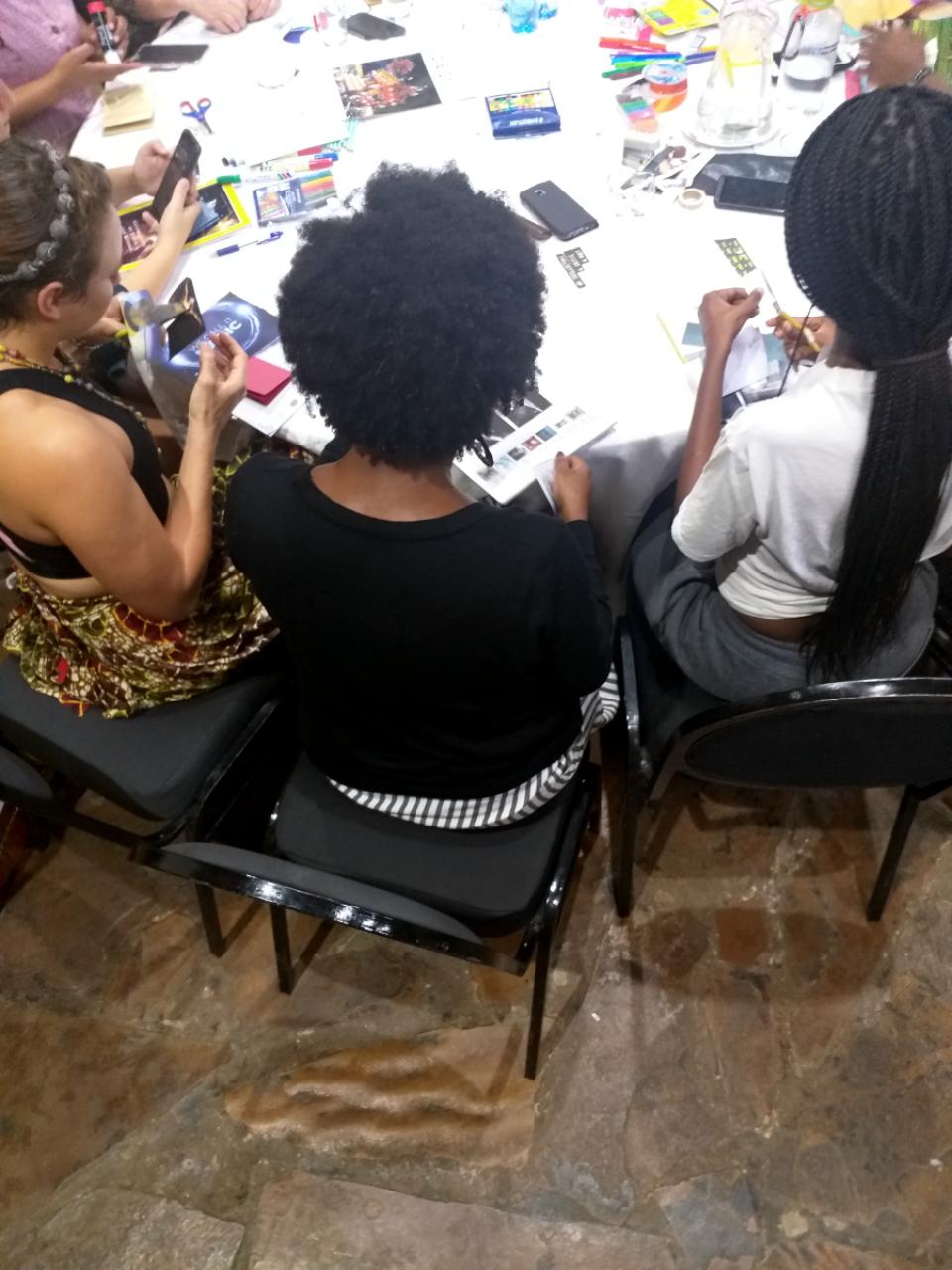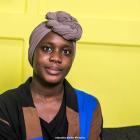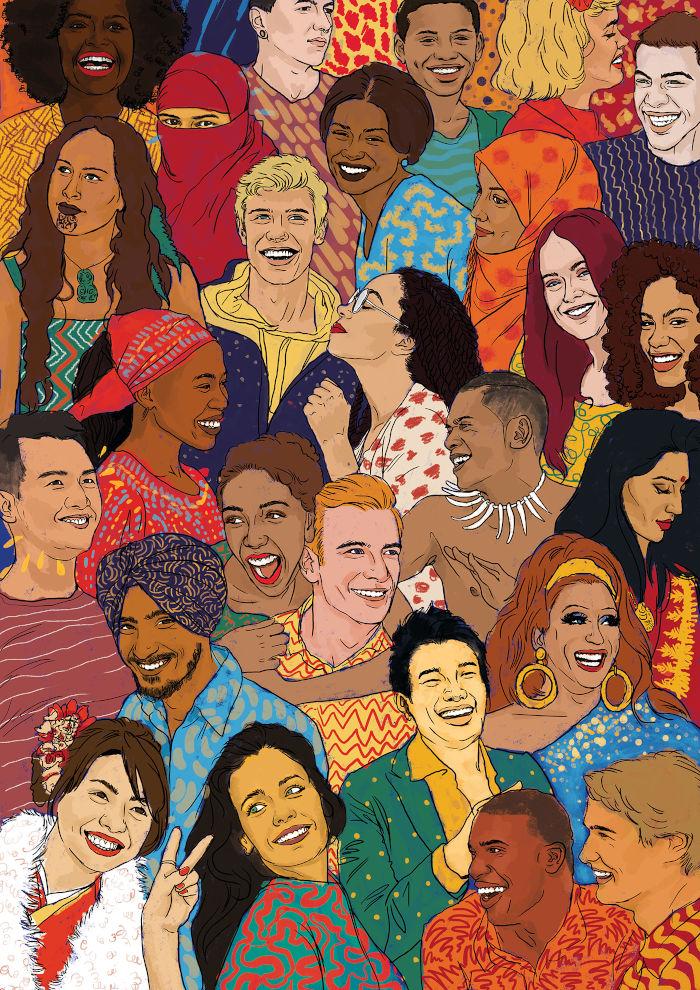
Participants of #MFIAfrica 2019.
The “Making a Feminist Internet” convening held in Johannesburg from 28 to 31 October 2019 by the Women’s Right Programme (WRP) of the Association for Progressive Communications (APC) was one of the most refreshing gatherings of feminists and activists I have ever been in. It held really powerful and diverse conversations by women from across Africa doing work on digital and internet rights, human rights, women’s rights, sexual and reproductive health and rights (SRHR), etc. It is also the first ever international feminist event I have attended since I started my journey, which was both breathtakingly awesome and neurotic.
On 26 October, a day before travelling to Johannesburg, I hosted a #Jotai talk through a co-founded initiative, Equals Now – a feminist movement in Gambia working both online and offline to shift stereotypes on gender and sexuality – on the topic “Feministing Online and Offline”. While I was doing research on the topic, I came across the “Imagine a Feminist Internet” discourse in one of the articles I was reading. Shockingly, despite my many followings of African feminists online (Twitter), I had never come across the Feminist Principles of the Internet (FPIs) or the discussion of what a feminist internet should look like. It had me wondering whether this is a new concept to feminists in the region, or is it just off context and far from the realities that women in Africa are working on? Whatever the case may be, the #MFIAfrica convening made me realise the need to build and maintain a strong feminist movement in Africa, more so within the various countries we live in. This movement must also be inclusive and accessible to all marginalised women in our different communities – online and offline.
The Gambia is quite frankly far behind most African countries in organising collectively as feminists, and even on the issues we advocate for, this is not an issue as the intersectionality of women in Africa may vary depending on where they are from. There has been ongoing debate about how West African feminism might be regressive compared to our Southern and East African counterparts, partly because feminists from Nigeria, Ghana, Senegal and The Gambia still hold discussions on domestic gendered roles and milder inequality concerns. I do not necessarily think that this sort of discourse is regressive, but rather that it reflects the core issues and aspects of our feminisms. Female genital mutilation, gender-based violence and child marriage are problems that women still go through in The Gambia. These problems persist due to their advocates claiming Islam supports these practices, despite them being more cultural as opposed to being sanctioned by or based on religion. The disproportionately small number of women who have access to resources or are at all educated out of the 50% women population makes it easier for these issues to thrive without any accountability measures. The over-sexualisation of women and their bodies is rife, especially towards Muslim women due to the concept of modesty. The education of women in religion and among underprivileged women is needed in order to dismantle the structures in our societies built by men that these myths thrive on. In doing so, this would in one way or the other require a talk on whose responsibility it is to cook, clean or take care of the children. In order to occupy more “relevant” spaces as women, patriarchal concepts of gender should be dismantled first before any real substantive progress can be made. I also believe that all concepts of feminism are applicable and can coexist depending on the cultural profundity of the people it is being applied to in order to achieve the goal of equality and freedom.
There is a new wave of feminists and gender equality advocates in The Gambia that are investing their efforts in translating online discussions into broader spaces and conversations offline. There have been a lot of feminist movements in African countries that were sparked online and grew bigger into offline activities such as marches, protests and long-term projects that address issues that women face. In all organisations and issues for change, our identities and cultural similarities come at the forefront because that is how we are able to come together for causes as a community; this community could be of queer, disabled, displaced, widowed or poor women. Scholars like Heather McKee Hurwitz and Verta Taylor have argued that our gender identities tend to give rise to distinctive cultures characterised by female values and practices that can become the basis for the formation of gender-based collective identities that lead to collective mobilisations for social change. Building movements takes time, especially in places where formal ways of feminist pedagogies have been practised for a long time by heterosexual feminists. Current feminist movements in many African countries tend to be more inclusive to LBTQ women because a good number of them now head movements and the issues we fight for are not just heterosexual issues. This is also similar for women in conflict zones who are heading movements to also fight for the issues that they mostly struggle with in their communities. While writing this article, I spoke to Ann Kay, a Zambian feminist, on the inclusivity of the feminist movement in her community. She mentions the support feminists now give and get online:
“We are able to make true differences online. You cannot reach everyone because we all are not going to have enough funding to go to rural areas, but you can create a movement online that teaches someone and many others”.
The misconception of feminism and “feminist” as a word plays a great role in representation. Women who have been fighting for the issues of women and girls for so long and then find themselves in power often get carried away by respectability politics. This further pressurises them to deny being identified as feminists or to even ignore the grassroots issues of women that they had advocated for. However, if we truly want to represent women, we must build spaces that are accessible and inclusive to all women without having a divided movement that is not a representation of our intersectionality. We should also intentionally acknowledge poor and financially disadvantaged women whose stories we use as proof of the inequalities in our societies but who are often left behind when it is time for us to organise. We must also take into consideration women with disabilities, for whom it is almost impossible to participate in our programmes because of the inaccessibility of the spaces we create. Becca Bunce, in “Accessing Feminism”, wrote on the advocacy of women with disabilities in the feminist movement: “All in all, this has resulted in feminists ignoring campaigning for access despite it being a directly feminist issue. At times, it can seem like feminism and disability are competing for spaces…”
Sometimes, it may seem as if the fight for gender equality is separate, and that an issue of oppression should be taken upon individually by the women whom it affects, whereas our intersectionality should allow criticising the different forms of oppression that affect women, even when those systems do not interfere with our identities. I interviewed Mamy Sira, a woman who is very involved in the feminist movement online in The Gambia but because of her disability, she cannot participate in certain spaces that are not disability-friendly – to be specific, not accessible for women who cannot hear and are not sign language literate:
“Although most organisations/movements are open to all women, the level of participation of women with disabilities also largely depends on the type of disability you have. In my case (being deaf but not sign language literate), it is easier for me to join online movements, although I often feel like my presence is just for visibility and moral support. My access to these spaces is limited in regard to how I learn or participate while present. Being in those spaces makes me feel good because I’m surrounded by like-minded women but it also makes me feel like I’m back in school and relying solely on the blackboard to understand the lesson, whereas my peers have the added advantage of in-depth explanations directly from the teacher’s mouth”.
It is a step forward in movement building to acknowledge that it is very likely we will leave other women behind while we try to include everyone, but on every step of the way, we should also be conscious of how we might be discriminating against other women when fighting for equality. When speaking on access, the conversation largely is shaped around women with disabilities or women in conflict areas. Our systems and institutions largely ignore these women’s participation in a way that is different from how women who would be considered physically able are discriminated against. Even when speaking on violence against women, we fail to interrogate how the realities of women with disabilities could make their experiences on sexual and gender-based violence different from ours. Certain marginalised women – especially women with disabilities and LBTQ in this case – find it easier to express themselves and occupy online spaces because they can be anonymous and participate wholly without being reminded of their disabilities or orientation. This is particularly useful for LBTQ African women living in patriarchal and heteronormative societies where it can be threateningly dangerous and toxic to manoeuvre offline spaces. Nonetheless, their inclusion should not only be limited to online spaces, but rather we should create safe, open and brave spaces in the feminist movement where women are not merely spectators or there to fill up empty seats.
The challenges of access and non-inclusion of more disadvantaged women to me resembles double oppression against these women who find it difficult to fully function in spaces that are created by women and meant for women. This is comparable to the practice of using women as quotas in boardrooms and parliament houses by men who merely want to appear “progressive” or pro-equality to score political points. The integration of all women in our programmes should guarantee their full participation and not just to check donor criteria boxes. Poor women and women with disabilities have been incessantly used by mainstream media to exhibit the level of inequality in our communities, and their sufferings largely remain the same after these depictions go viral. Even though our intentions as feminists with more access to spaces are virtuous, how do we ensure that when we claim to represent women, we really are fully aware of the issues of these women?
My struggles are different from those of poor women, or women without formal education, women with disabilities, women in the diaspora, and seemingly women who are part of other religions besides Islam. Regardless, we are all disadvantaged in different spaces and levels. The broader intersectionality of my advocacy, as a Black Muslim cis-gender woman from a working class family in a patriarchal society, comes from a place of oppression of the many uneducated Muslim women whom are deprived of their basic human rights disguised in religious scriptures. As a Muslim woman, it is quite difficult and/or impossible to separate being Muslim from being a woman. From lived experiences, Muslim women suffer a great deal from inequality. Islam is presumed to be a feminist religion that allocates women equal rights as to men, but Muslim women are not benefitting from these rights.
From 6 to 9 December 2019, a group of Gambian feminists curated content for a movement on gender-based violence (GBV) and violence against women (VAW) seizing the #Gambiana hashtag along with #EndVAW and #EndGBV. One of the most visible cases at the time was the case of a famous Gambian artist who was accused by his wife of domestic violence and the issue was being trivialised because of his social status. Closer to the launch of his album called “Gambiana”, the talk on GBV was reignited, and a lot of victim-blaming and abuser-siding was expressed by “prominent” Gambians who also have demonstrated progressiveness on gender equality. It is true that this case was among the very few high-profile sexual violence cases that are arising in the Gambian public sphere, which unfortunately were not collectively addressed by civil society organisations; this is especially the case for women-led groups or movements. Yet, we witness cases that went viral (such as the above example) after being taken on instead by individuals on social media. Prior to the #Gambiana campaign, I had not witnessed a movement in The Gambia that started online and quickly grew widely into offline conversations in just three days. This was a welcome surprise, especially since the main contributors were not part of conventional groups or organisations but were rather women and men with demonstrated interest in promoting gender equality and human rights.
A fraction of the women that joined the campaign were Gambians in the diaspora who are not oblivious to the discrimination that local women face. However, this is not synonymous with taking away the voices of local women when representing them and their struggles in wider spaces; it is merely acknowledging that one is in a position to lead change in the lives of these women by representing them in spaces they cannot occupy. When we echo the voices of women who experience different realities as ourselves, in the case of women in the diaspora who still contribute through their privileges of access and power to amplify the stories of local women, the representation should be valid. In allying, we should allow women to represent themselves where it is necessary the most, and when this is impossible, we should not assume spaces and claim experiences that are not our realities. In the words of Haddy-Jatou Faye, a Gambian feminist living in England:
“Strong feminist movements and progress in The Gambia will be hard to achieve without open discussions with men and women around the issues that need to be tackled. If we can implement programmes and hold discussions among the younger generations, it continues to improve from there. As for the older generations, information and encouragement is the way to build a stable movement. Many people have a misconstrued view of feminism, hindering them from getting involved. Still, as long as the conversations are willing to be held on social media platforms (mainly), change can be made. Considering inclusivity is vital in this situation”.
Being a Muslim woman has been the biggest influence of my activism and it helps me to analyse and inform my support and solidarity for other marginalised women. It may have been way easier for me to rapidly be an organiser for social causes because of my access to education, networks and technology, but there are other women in The Gambia who are not fortunate enough to reach these networks. As gender activists, through the organisations we occupy, and in our capacity as individuals who have access to different platforms, it may seem strenuous to open up our spaces to women in the early stages of their feminist journeys. As Gambian feminist Ya Fatou Joof explains it:
“I have been part of a few online movements. The only and first offline movement I took part in was a march on sexual violence to show solidarity to a victim of rape by the former president of The Gambia, Yahya Jammeh. #IamToufah, thinking about it now, I do not believe that counts as a movement”.
Our resistance may – or may not – be determined by the level of discrimination we face in our communities, or by how we are ready to fight on our own without the need to be part of a defined group, but this position might not be the case for everyone. This stance is more pertinent online than offline, because occupying a space that does not acknowledge your presence can be frustrating. More so if you are occupying a space that is open to you but does not allow your participation due to cultural, physical or class differences. It is fundamental to ensure that when organising, we do not overlook women who do not have “feminist” on their bios but are resisting and defying in their homes, schools and workplaces. When we represent, we need to make sure that we do not get carried away by the power and fame of being at the forefront of movements and organisations; that we do not forget the women that don’t have access to the same spaces because they are illiterate, disabled, poor or otherwise discriminated against or marginalised. That we do not forget the women who fight for equality without the theories and contextualisation, or the conferences, workshops and convenings. That we do not lose purpose in being inclusive and sustaining movements while trying so hard to be “older feminists” or gatekeepers of the feminist movement or organisations. This is not a fight of “us” versus “them” because patriarchy is systemic, not personal. This is a fight of people who want to live lives free from violence and abuse; a fight that must be all-inclusive and a fight we cannot afford to lose.
- 5691 views








Add new comment